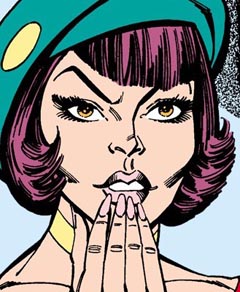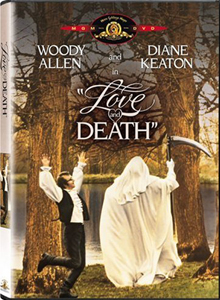Appearing to be dour and grim in the fashion of Russian tragedies, “Love and Death” (1975) wasn’t at the top of my stack of Woody Allen movies. But it should’ve been higher up, at least. This parody of the genre is remarkably easy to get into even if you have only a broad sense of the tropes (I brought my knowledge from “Vanya on 42nd Street” from my David Mamet series).
Modernized humor
Even if you don’t know Anton Chekhov from Pavel Chekov, you’ll find humor in the way “Love and Death” goes off on modern tangents as a way to illustrate how extreme direness can be absurd.
Diane Keaton again pairs wonderfully with Allen, understanding the rhythms of the gags. (Don’t worry: Both speak English and don’t try for accents.) “Play It Again, Sam” and “Annie Hall” are character-driven masterpiece whereas “Love and Death” is a goofball parody, but as far as goofball parodies go, I laughed a lot.
Among skewerings of olden-days adventure tales, “Love and Death” isn’t mentioned as often as Monty Python, “The Princess Bride” or “Robin Hood: Men in Tights,” but it should be.
Developing clout
This is still early in Allen’s career, but he already has enough clout to get worthy locations, as Hungary nicely stands in for historic Russia. The staging, framing and editing are basic, but the mood of “Love and Death” is so brisk and fun that it doesn’t really matter.
It gets some laughs from the expected: Allen’s Boris is the one nebbish intellectual among the otherwise brawny, bearded types heading off to war against French invaders, as illustrated by montages where he’s not up to snuff.
Last in the line of rifle shooters, his rifle breaks when he fires. So bad luck is part of Boris’ character, too, as also seen by his unrequited love for his (second) cousin (once removed) Sonja (Keaton, who could’ve played Princess Leia with these hair buns). Although she loves him, she’s not “in love” with him – but she makes time for every other guy in the realm.
Giving the film a second wind of laughs, Boris has one burst of good luck in the war and is labeled a hero and a top man in the Russian cause. So more comedy is gleaned when Boris and Sonja team up to assassinate Napoleon (James Tolkan).
A great running gag finds the neurotic Boris infusing morality and spiritual theorizing into wars and assassinations. The gag kicks off when Boris and Sonja discuss the likelihood of there being a God, speaking in terms (“ontological,” “metaphysical” and “epistemological”) that are found in learned essays but never in everyday conversation.
Just plain goofiness
Keeping us on our toes, Allen peppers in just-plain goofiness, such as cheerleaders and refreshment vendors on the battlefield. When Boris flirts across an opera hall with the sexy Countess Alexandrovna (Olga Georges-Picot), both of them peeking seductively from behind feathers, Leslie Nielsen might’ve been taking notes. And there’s self-deprecating proto-Whedonian dialog such as “My disgustingness is my best feature.”

“Love and Death” sputters at the end. The narrative pays off Boris’ obsession with death, but there’s a gradual downward arc to the laugh rate. But, as is often the case in his work, Allen has a good sense for when a film is overstaying its welcome, and it wraps at 85 minutes.
Because it’s not a layered entry, I rank this a notch below his elite films, but it’s a ton of fun and will be enjoyed by any film fan who enjoys a witty parody.


